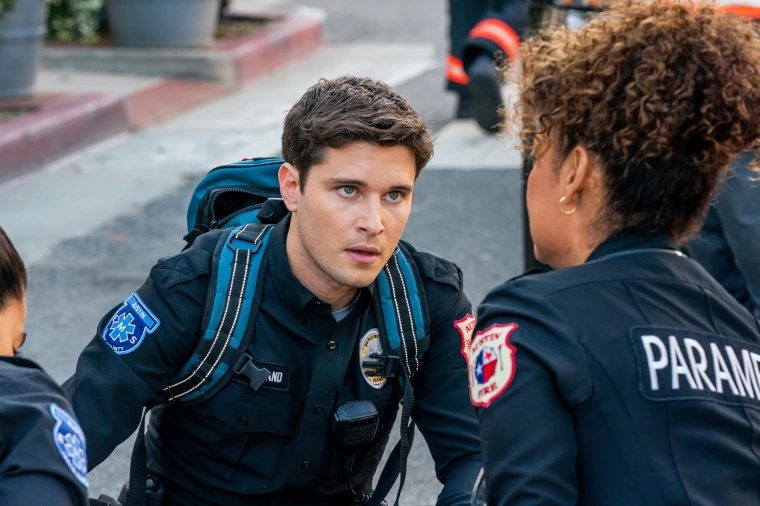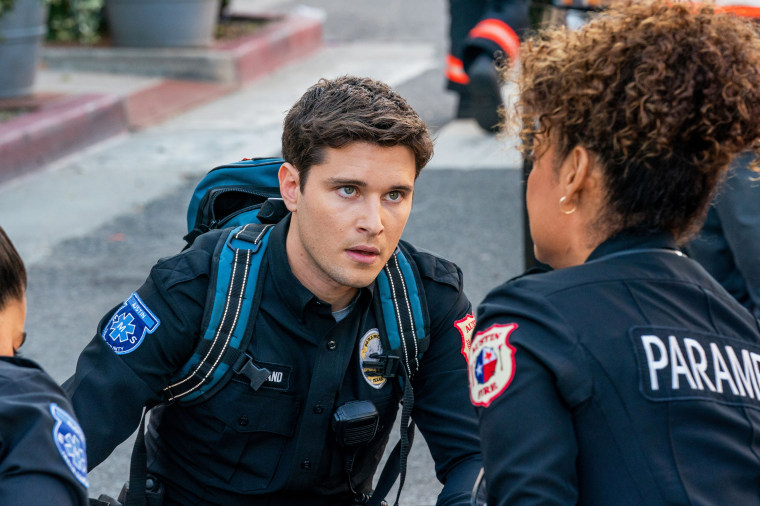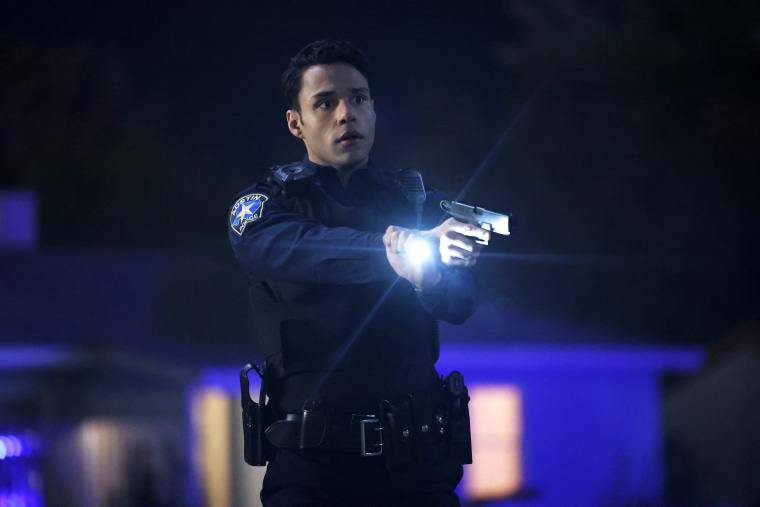
‘9-1-1: Lone Star’ actors break down the big ‘Tarlos’ relationship decision
- by admin
- Posted on 14 September, 2024
Ronen Rubinstein and Rafael Silva, who play T.K. Strand and Carlos Reyes on the hit Fox show, look back on their characters’ multi-season arc and ahead to their next chapter.
This article includes spoilers for “A Bright and Cloudless Morning,” Monday’s season finale of “9-1-1: Lone Star.”
In the episode, T.K. found Carlos updating his will, leading to a fight over T.K.’s refusal to plan his own estate. But after having nearly lost his father, Owen (Rob Lowe), in a building explosion, T.K. — who had unexpectedly lost his mother, Gwyn (Lisa Edelstein), earlier in the year — had a change of heart, waking Carlos up in the middle of the night to declare that he would leave everything to his “husband,” meaning Carlos, before he popped the question.
“My life has been scarred with loss, and at times, it’s felt inescapable,” T.K. told Carlos. “But that’s the risk of love, right? For the first time in my life, the love that I feel is infinitely more powerful than the fear of losing it. … Every moment that we’re not married is a wasted moment. And baby, we only get so many.”
T.K.’s impromptu proposal was one of many endings that Rubinstein and Silva said they discussed with co-creator and showrunner Tim Minear. This version was ultimately chosen to hark back to how T.K., a recovering addict, was introduced in the pilot, when his last failed marriage proposal led him to relapse and overdose on painkillers.
“I think what the finale symbolizes in many ways is closing the chapter on your past traumas, on your past demons,” Rubinstein said in a joint video interview with Silva. “With T.K., I think it’s the initial proposal that almost led to his death, and I think this is a new chapter for him and everything’s going to be OK, it seems like. And he’s actually found the man of his dreams and somebody that he wants to spend the rest of his life with.”
Rubinstein said he loved the idea of the proposal’s “being something that he just has to get off his chest.”
“He literally wakes [Carlos] up at 3 in the morning,” Rubinstein added with a laugh. “And he’s like: ‘Marry me right now! I can’t wait any longer!’ It’s so romantic in many ways.”
Silva, who said he “was very happy” and that he “got super excited” when he read the final script last month, revealed that the proposal was shot with multiple cameras “rolling at the same time,” allowing him and Rubinstein to stay in the moment during every take.
“The reactions that you’re getting are not layered in the sense where we’re cutting bits and creating this sort of performance,” he said. “You’re getting it live from both of us at the same time.”
He added: “When I first read the scene, I thought the scene was funny … which is perfect, especially in a proposal at 3 a.m. One is waking up; the other one’s coming to this realization of what this relationship is.” The “quirkiness in the scene,” he said, “went really well against this emotional stride” that they were making together as a couple.
As they began to rehearse the pivotal scene with director and executive producer Brad Buecker, Rubinstein and Silva — who both said they always knew that a “Tarlos” proposal was a matter of when, not if — revealed they both started crying during the initial read-through, before cameras were even rolling. Buecker “immediately felt the vibe, and he’s like: ‘All right, let’s cut rehearsal a little earlier. You guys go get ready, because the emotions are already there. … Let’s save it for the real thing.’ And it was like that every single take,” Rubinstein said. “I just remember it being so powerful and so epic and really beautiful, and the words did all the work for me.”
The engagement marked the culmination of a dramatic seasonlong arc for T.K. and Carlos. In an interview over the winter, Rubinstein teased that “a major bombshell” would be dropped in the season premiere, alluding to a shocking “Tarlos” breakup. It wasn’t until the third and fourth episodes, when T.K. found himself in another coma — this time after having nearly died of hypothermia in a deadly winter storm in Texas — that the two first responders discovered they were stronger together than apart.

“The reason they broke up was completely on T.K.’s foolishness and his past habits of blowing something up when it’s going too well,” Rubinstein said. The fact that T.K. is able to cheat death once more “makes them realize what’s truly important … and it’s fighting for this relationship and knowing that they were actually perfect,” he said. “I think waking up from that coma and seeing the only person he probably wanted to see when he woke up right there holding his hand and then hugging him, for T.K. at least, was all of the reasons to truly commit and to truly give his everything.”
Carlos, on the other hand, had effectively declared his lifelong commitment between seasons when he made T.K. a co-owner of their new apartment, despite having fronted all of the costs himself, Silva said.
“That was Carlos’ version of the proposal. That was Carlos’ way of saying: ‘I kind of want to get married. … I kind of want to spend the rest of my life with you.’ And then T.K. said no,” Silva said, referring to T.K.’s refusal to accept the generous gesture.
As soon as T.K. woke up from his coma, Silva added, “Carlos is struggling to even move his hand to grab T.K., because it’s like: ‘I was rejected by showing all of me. Is this what I really want? Is this what I think I deserve? Is this something that he thinks he wants, too?’ But in that moment, no words are needed. You just see the love between the two.”
Rubinstein said that given that T.K. and Carlos already live together, know each other’s families well and have created a tight bond with the other members of Station 126, he felt the engagement was always going to be a “natural progression” of their relationship.
Rubinstein said he thought the final scene of episode 13, which debuted April 11, in which Carlos realizes the best way to support T.K.’s sobriety is by calling his sponsor, was “crucial for T.K. to know, like: ‘OK, I knew this was the man of my dreams, but now he’s really proven it. That was the last thing he ever had to do. I would marry him right now.’ That storyline is so special, and I think it’s many people’s favorite episode, because we get to have real-life couple conversations — and it’s really difficult conversations, too.”
“I think breaking them up at the beginning of the season was really brilliant, because I always said the journey of them getting back together is more interesting than if things were just going very well and smoothly throughout the whole season,” Rubinstein added. “I remember Tim [Minear] always saying, ‘We have to earn this relationship, and we have to earn this proposal,’ and I honestly think we did. I think 42 episodes is enough.”
Following Monday’s announcement that “9-1-1: Lone Star” has been renewed for a fourth season, Rubinstein and Silva quipped that as much as they would love for the coming nuptials to go off without a hitch, they’ve already begun to brainstorm any number of things that could go wrong, given the “9-1-1” franchise’s reputation for outlandish emergencies.
“Someone’s going to choke, someone’s going to have a heart attack, an earthquake’s going to take place — all at the same time!” Silva said with a laugh. “I think it’s going to be special either way. I want Carlos to be the most Texan. I want him to wear a cowboy hat — like, all Tejano gear — to his wedding. I want to show the Mexican American culture … because America is beautiful and has many shades, and we need to show that on national television.”
Rubinstein said with a playful smile: “We would have a honeymoon, and I was like: ‘Listen, if production wants to send us to, let’s say, Hawaii, and there will be something that we have to deal with there, I’ll take it. I don’t care. I’ll deal with a rescue with Carlos and T.K. in Hawaii. I’ll deal with anything if we go to Hawaii.’ I’m just so, so excited that we know that there is a wedding and honeymoon on the horizon.”
While Rubinstein said he wants to continue exploring T.K.’s personal and professional relationships in subsequent seasons, Silva, whose character hasn’t had as much screen time in the first three seasons, said he wants to see where Carlos “comes from” and “how he is as a person.”

“We’ve seen a good amount of how he’s come to be … and I think those characteristics are mistaken for personality traits, like ‘control freak,’ ‘super caring,’” Silva said. “I think that’s just the result of everything that he’s been through, and I think everything he’s been through is way more interesting than all of these coined personality traits, and I think it would be interesting exploring that.”
But at the end of the day, both actors understand the importance and shared responsibility of telling a prominent love story between two men when anti-LGBTQ legislation continues to be passed across the country — and around the world.
“I think now more than ever, it’s beyond imperative to show this sort of relationship on network television. Television brings conversations into homes that might not be asking for such conversation,” Silva said.
“With over 250 [anti-LGBTQ] bills trying to be passed, seeing this sort of relationship being portrayed right now and this sort of reality where two people can just sit in bed and commit themselves to each other for the rest of their lives, I think it just speaks to the commitment to the diversity of the show and what we want to see in real life, as well,” he continued. “We want to let viewers [know] that this love exists, it is legitimate, and it deserves to be on the screen.”
And when the time comes, Rubinstein and Silva said, they would both love to see T.K. and Carlos start a family together, because “you don’t know how powerful representation is until you see yourself” — and what’s possible — on television, said Silva, who is openly gay.
When you depict a relationship between two men “caring and loving each other and caring for this child,” you’re sending a message “that these are human beings who simply love each other, who deserve to love each other, that all of this prejudice against the LGBTQIA+ community is coming out of fear and ignorance and shall not be entertained and shall not be condoned,” Silva added.
The fact that T.K. and Carlos are getting married on one of network television’s most popular dramas, which has averaged over 4.8 million live viewers this season, is groundbreaking in and of itself, Rubinstein said.
“To show them have a kid eventually would just break all the barriers, and so many people’s brains will explode for good and for bad,” he said. “People need to be uncomfortable, and people need to realize that this is real life, this is normal.
“I think this relationship is so important for opening people’s minds and eyes to what the real world is like and that we’re not some monsters,” said Rubinstein, who is openly bisexual. “We just want to be treated fairly and equally, to be loved and to be treated with respect and kindness, and that’s it. … So it’s about time that we start showing these kinds of storylines on such a massive network.”
Ronen Rubinstein and Rafael Silva, who play T.K. Strand and Carlos Reyes on the hit Fox show, look back on their characters’ multi-season arc and ahead to their next chapter. This article includes spoilers for “A Bright and Cloudless Morning,” Monday’s season finale of “9-1-1: Lone Star.” In the episode, T.K. found Carlos updating his…